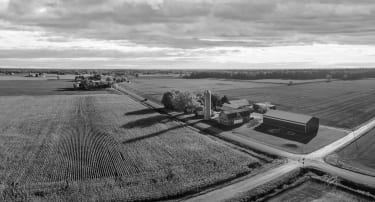It is often the case that when part of a parcel of land is sold (or otherwise transferred), the seller will retain rights for the passage of services, electricity, water, gas etc, over, under and through the land being transferred. Equally the buyer will reserve the same rights over the parcel remaining with the seller.However, this can lead to problems if the party who should be responsible for maintaining those services is not clarified. This is particularly the case if the medium for the utility is not being used by the land through which it runs.
For example you may, as a seller, have a connection to mains drainage directly from the highway drains for surface water. You have installed a ditch to the drainage pipe which then runs through your land to serve the land you have sold, or you may have installed a culvert if your land is next to a river, stream or ditch. You do not connect into that ditch or culvert and it is entirely for the benefit of your seller. Are you then responsible for looking after that construction?Ideally the transfer will set out the obligations of each party. So you may see a restriction on the seller of the land from building over the ditch or culvert or interfering with it in any way.
You may see a further obligation on the user of the ditch or culvert to maintain it at their own cost and, with that, he or she would have the right to access the land to maintain the structure, clean it, deal with blockages etc. Making good any damage caused.If the seller prefers to repair and maintain the construction (because they want to have control over it and who accesses their land for instance) then you should expect to see an obligation for the buyer to pay towards the costs of this (or all the costs if the ditch only serves the buyer’s land). The provision for the seller to repair and maintain the structure, whatever it is, is a positive one so the seller should also have an obligation to ensure that any buyer of the land with the structure on it, should also be required to maintain it as the repair and maintenance obligation will not automatically pass with the land. This would be done by way of a deed of covenant.
However what if the rights and obligations are not specified? In the case of drainage a landowner can apply under the Land Drainage Act 1991 for an order to require another owner to make sure that a ditch is usable and free from obstructions. The order can include a right for the party with the benefit of the use of the drain or ditch to access the land it crosses in order to carry out drainage work or alter the ditch.
Furthermore the Local Government Act 1972 enables local authorities to require that landowners repair and clean culverts on their land.
Nevertheless, clarity is always the best course and, if the buyer of the land is intending to develop it, then they should certainly not rely on statute for the maintenance of the surface water drainage medium. They should also ensure that it will adequately serve the land for its ultimate use. For instance, a right to drain surface water through a ditch on adjacent land, does not necessarily cover a right to drain into the ditch for any use to which that land is put.
As for culverts, the Local Government Act 1972 does not enable a local authority to require the enlargement of a culvert, even though it may not be big enough to take all the flood water from a parcel of land.If the use of the benefitting land is to be intensified with development then, from a construction point of view, you need to ensure that the structure you install will do the job.
You also need to ensure that your right to drain surface water over your neighbouring property is worded widely enough. For instance a right to drain surface water from the land while it is used solely for agricultural purposes will not include a right to drain the surface water from land on which 30 houses now stand.As always the details must be correct and the wording should be clear enough to protect each party. Often bespoke wording is required in development of land and your solicitor will need to know all the facts about the land in question and what you are intending to do with it. Ideally with a nice clear plan.
Get it right in the beginning and the rest will fall into place!
Please contact our Farms and Estates for further advice.
The content of this page is a summary of the law in force at the date of publication and is not exhaustive, nor does it contain definitive advice. Specialist legal advice should be sought in relation to any queries that may arise.
Contact us today
Whatever your legal needs, our wide ranging expertise is here to support you and your business, so let’s start your legal journey today and get you in touch with the right lawyer to get you started.

Get in touch
For general enquiries, please complete this form and we will direct your message to the most appropriate person.
